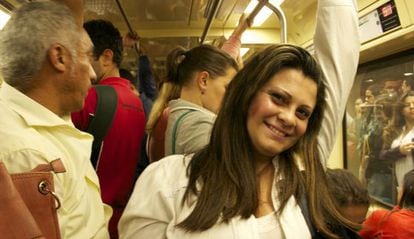The new Brazilian middle class: a decisive demographic in elections
Voters who climbed out of poverty under Lula’s administration will hold the key to the October polls


Kellia de Oliveira does not know when she will be able to have a baby. Her husband is not in a hurry but mostly he does not have the means to provide for a child. “If I can’t buy a steak, I buy a hot dog, but my son could not go without milk,” he says. “How can I support a child with what we bring home?” Their household income makes them part of Brazil’s new middle class, or Class C. Although he normally earns about 1,100 reales ($450) each month, when he is unemployed – which is frequently – the couple ends up closer to Class D. About 100 million working-age Brazilians live on salaries like Kellia’s, salaries of about 724 reales ($300), or three times the minimum wage.
These men and women are the new social class of consumers who make up a decisive demographic in elections. Their purchasing power, a powerful economic engine, has set off domestic consumption and, over the last decade, it has revolutionized the profile of the middle-class Brazilian. He has a university education, access to technology, a bank account, and credit. He buys brand-name clothing and has invested in a car. Many of them, like Kellia, already own their homes.
Her salary as an assistant accountant in a small publishing house is a little higher than 1,600 reales ($660) if she does not take a vacation. Then, she becomes a woman with more money but with no time to spend it. Born in Ceará (northeast Brazil), Kellia does not know Río de Janeiro or most of the cities in São Paulo Province where she lives. She has spent very few weekends on the coast. Her schedule is strictly outlined on an Excel sheet. A leak at home or an unaccounted-for expense means falling into the red at a time when nothing can be paid for in cash. “I live on my credit card,” she says. “I work thinking about what I have to spend. On a monthly basis, I rarely have anything extra for emergencies.”
Kellia was raised in a small town where there was not even a school. Her current status is much better than what she herself expected a few years ago. Her parents, a laborer and a cleaner, never earned or will ever earn what she makes. Kellia is the youngest of four children and the first to get more than a basic education. “My mother is very proud of me,” she says, her own voice shaking with pride.
However, she frowns when asked about what economists call the paradox of the new Brazilian class – the social miracle that lifted 30 million Brazilians out of poverty and the bustling black market attributed to the government of former President Luiz Inácio Lula da Silva. “In the northeast, the Workers Party (PT) helped but here… I already voted for Lula. We trusted him to do something for the people. He did something but it was not enough after 12 years in the PT. He had the power to do much more in education, in health.”
“This segment of the population that the PT brought out of poverty and helped get work contracts and credit, is now beginning to look at other political alternatives – now that it has to pay taxes – and it’s looking to the right,” says Luiz Carlos Mendonça de Barros, economist and current director of the agency Questinvest. Mendonça de Barros was minister of communication under Fernando Henrique Cardoso.
Although Kellia is not leaning toward the right, she does not want to vote for PT again. As a Datafolha poll published on September 10 showed, President Dilma Rousseff’s party is losing support among Brazilians who earn two to five times the minimum wage per month. But the party is still leading among the poor.
“I already voted without knowing anything about the candidate or the platform, but now I ask myself, what are they offering me? Now I try to educate myself about what they are defending, from women’s rights to proposals on education and healthcare.”
Since the presidential candidates’ platforms are either undefined or open to changes, Kellia has no idea what to do with her vote on October 5.
Translation: Dyane Jean François










































